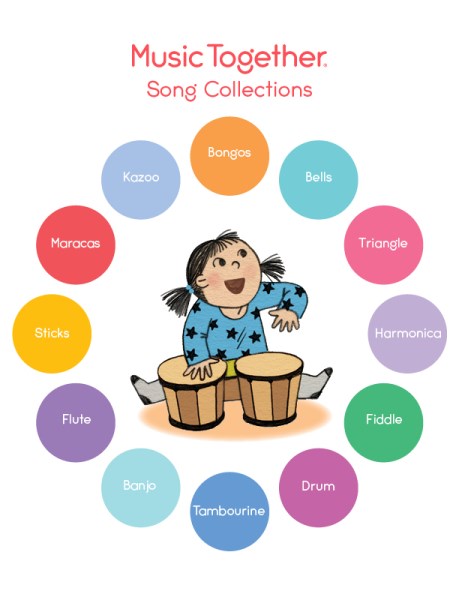What is a good age at which to begin Music Together®?
We believe it is never too early to begin making music with your child! An infant becomes musical in much the same way he or she learns to walk or talk: by being exposed to music, surrounded by it, immersed in it. Don't worry, though, if your child is older and hasn't had music classes yet. It's never too late to begin providing him or her with the joy of music-making.
Will I be expected to sing and dance?
No one will be expected to do anything he or she is not comfortable with. However, evidence shows that the participation of parents/caregivers (regardless of their musical ability) is crucial to a child's musical growth. You are the best model for your young child! And you just might find yourself having more fun than you expected when you relax and join in the fun.
Does my child need to sit in the circle for the entire class?
No. Your child is free to move around; it's developmentally appropriate for children to want to dance and move to the music. We hope that, while you keep one eye on your child and his/her safety, you will continue to participate in the class and model music making for your child. Don't worry if it seems like your child is not participating; many children go home and sing all the songs. Even though it may seem during class that they were more interested in investigating their environment, or practicing their new crawling skills, children often take in more than we realize. On the other hand, if you do happen to have a child who wants to sit in your lap the entire time, this is also fine. All children are different, and the same child may even be different at different ages/stages of development. We do ask, though, for everyone's safety, that there be no running unless we are all running as part of an activity.
What should I expect of myself?
Some parents are somewhat disconcerted by the concept of being their child's most important role model, especially when it comes to music! You may feel that you are not particularly musical - perhaps you even describe yourself as being "tone deaf." You may be great at singing but feel unsure of yourself or "vague" when dancing or trying to "keep the beat." Whatever the level of your technical skill, remember the most important things you can model for your child are simply pleasure, interest, and the desire to participate in music activities.
Many adults feel deprived, confused, or inadequate about their ability in music, as if they have been denied something that should be effortless and natural. In fact, this is often the case. As your understanding of your child's music development grows in the coming weeks, you may also come to understand that unfortunate circumstances in your own childhood music experience may be at the root of some of these feelings. More important, by participating with your child, you can begin to rediscover within yourself the natural human musicality that is everyone's birthright.
I lost my music. Can I order another set of class materials?
Currently enrolled families in a Music Together® class may order replacement or extra copies of the music or songbooks by emailing [email protected] or by calling (800) 728-2692 x30

